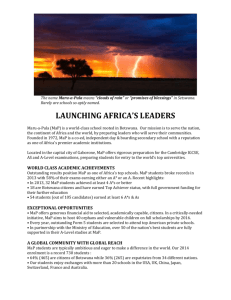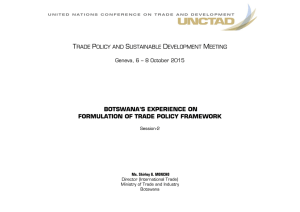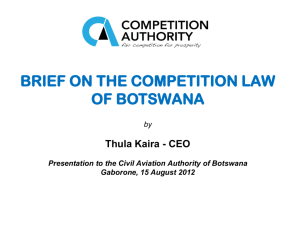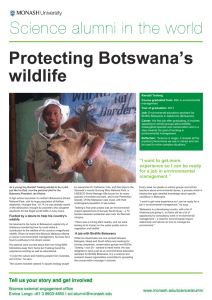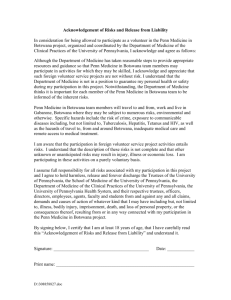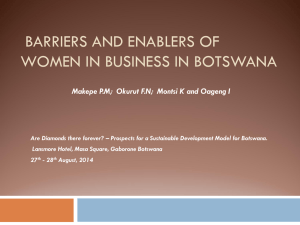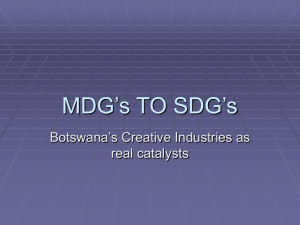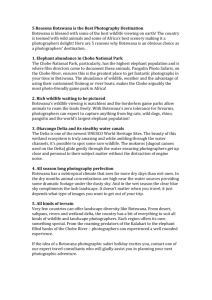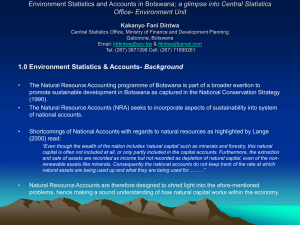violations of linguistic and cultural rights of the wayeyi tribe in
advertisement
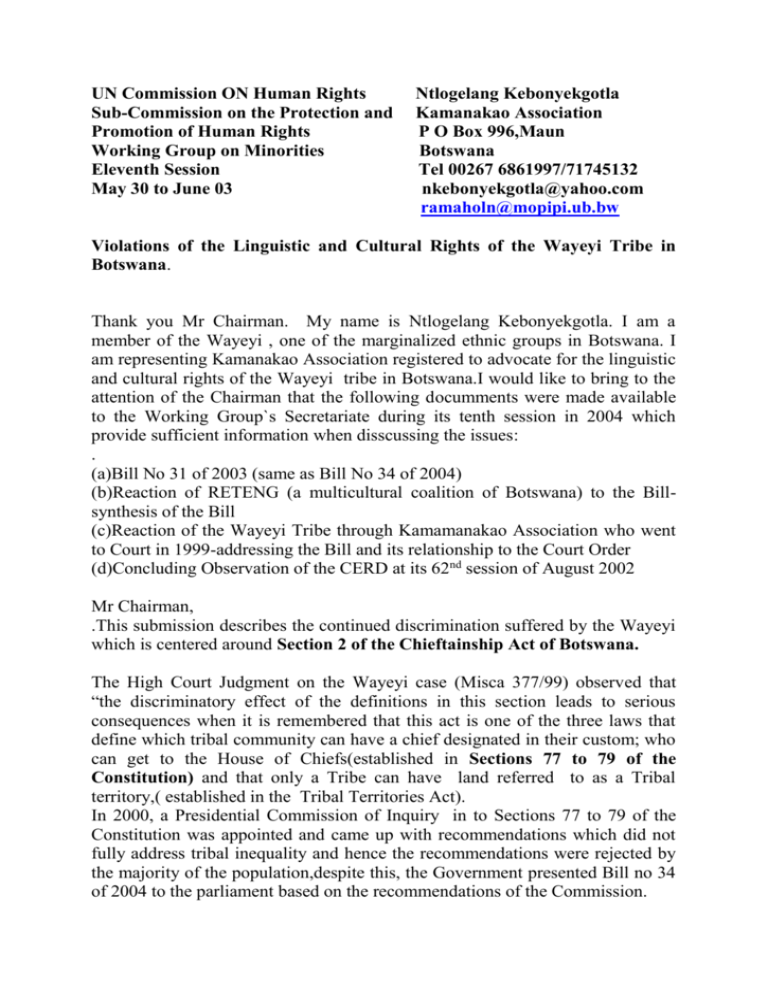
UN Commission ON Human Rights Sub-Commission on the Protection and Promotion of Human Rights Working Group on Minorities Eleventh Session May 30 to June 03 Ntlogelang Kebonyekgotla Kamanakao Association P O Box 996,Maun Botswana Tel 00267 6861997/71745132 nkebonyekgotla@yahoo.com ramaholn@mopipi.ub.bw Violations of the Linguistic and Cultural Rights of the Wayeyi Tribe in Botswana. Thank you Mr Chairman. My name is Ntlogelang Kebonyekgotla. I am a member of the Wayeyi , one of the marginalized ethnic groups in Botswana. I am representing Kamanakao Association registered to advocate for the linguistic and cultural rights of the Wayeyi tribe in Botswana.I would like to bring to the attention of the Chairman that the following documments were made available to the Working Group`s Secretariate during its tenth session in 2004 which provide sufficient information when disscussing the issues: . (a)Bill No 31 of 2003 (same as Bill No 34 of 2004) (b)Reaction of RETENG (a multicultural coalition of Botswana) to the Billsynthesis of the Bill (c)Reaction of the Wayeyi Tribe through Kamamanakao Association who went to Court in 1999-addressing the Bill and its relationship to the Court Order (d)Concluding Observation of the CERD at its 62nd session of August 2002 Mr Chairman, .This submission describes the continued discrimination suffered by the Wayeyi which is centered around Section 2 of the Chieftainship Act of Botswana. The High Court Judgment on the Wayeyi case (Misca 377/99) observed that “the discriminatory effect of the definitions in this section leads to serious consequences when it is remembered that this act is one of the three laws that define which tribal community can have a chief designated in their custom; who can get to the House of Chiefs(established in Sections 77 to 79 of the Constitution) and that only a Tribe can have land referred to as a Tribal territory,( established in the Tribal Territories Act). In 2000, a Presidential Commission of Inquiry in to Sections 77 to 79 of the Constitution was appointed and came up with recommendations which did not fully address tribal inequality and hence the recommendations were rejected by the majority of the population,despite this, the Government presented Bill no 34 of 2004 to the parliament based on the recommendations of the Commission. On April 14th 2005,Botswana Parliament passed Bill no 34 of 2004 to ammend Sections 77 to 79 of the Constitution which recognised only the numericalminority Tswana speaking Tribes at the exclussion of the numerical majority non -Tswana speaking Tribes which include the Wayeyi.As a follow up to its recommendations of August2002,the Committee on the Ellimination of Racial Discrimination sent out a letter dated March 10,2005 to draw to the attention of Botswana the significance of having a Bill that will eliminate both direct and indirect discrimination.It further called on the Government to engauge in a dialogue with the minority representatives.Both local and international NGOs made recommendations to improve the Bill but this widespread concerns about the discriminatory effects of the Bill were not consireded and the Government went ahead with the Bill. The practical effects of these three laws is that the Tswana tribes are still consulted and involved in decisions concerning their lives through their Chiefs and have sovereignty over and group rights to land, have their language used in education and the national media. The Wayeyi are not recognized and hence denied all these fundamental human rights enshrined in the United Nations Declaration on the Rights of Persons Belonging to National or Ethnic, Religious and Linguistic Minorities, the Universal Declaration on Human Rights (UDHR,article 7) and the International Convention on the Elimination of All Forms of Racial Discrimination (ICERD, article 5) The only change the Bill has brought is to increase the number of elected headmen, a subordinate position in the House of Chiefs, which does not amount to the review of the Laws as it was recommended by CERD in 2002. The Headmen are to be elected by electoral colleges and not the people in violation of Article 25 of the ICCPR, Article 3 of the African Charter on Human and Peoples “Rights (ACHPR) and Article 2.3 of the UNDM. The Law still maintains the status quo ,of Tswana supremacy over Minority Tribes such as the Wayeyi Mr Chairman, i would like to appeal to the international community to take interest in the deteriorating state of democracy in Botswana ,and we also believe that , Botswana is one situation where international community can practice preventive and early warnig measures with great success. Recommendations The Government should not implement the revised laws but continue dialogue with the Minorities representatives particularly the Wayeyi The Government should start using the Minority languages in the Public Media and in education especially those languages with writing systems such as Shiyeyi. The Government should appoint a Coroner to conduct an investigation into the death of the Wayeyi chief and in to the investigation exercise that took place thereafter,to establish its credibility. The findings should be shared with the Wayeyi and the family of the chief. The Working Group should draw to the attention of Botswana its persistent and consistent violations of Human Rights of both the national and international standards on issues of minorities. The Working Group and other UN Organs should encourage Botswana to ratify the first protocol of the ICCPR and article 14 of CERD as mechanisms to enrich its democratic process.
